Soccer newsletter: Mexico may face more penalties thanks to homophobic chant
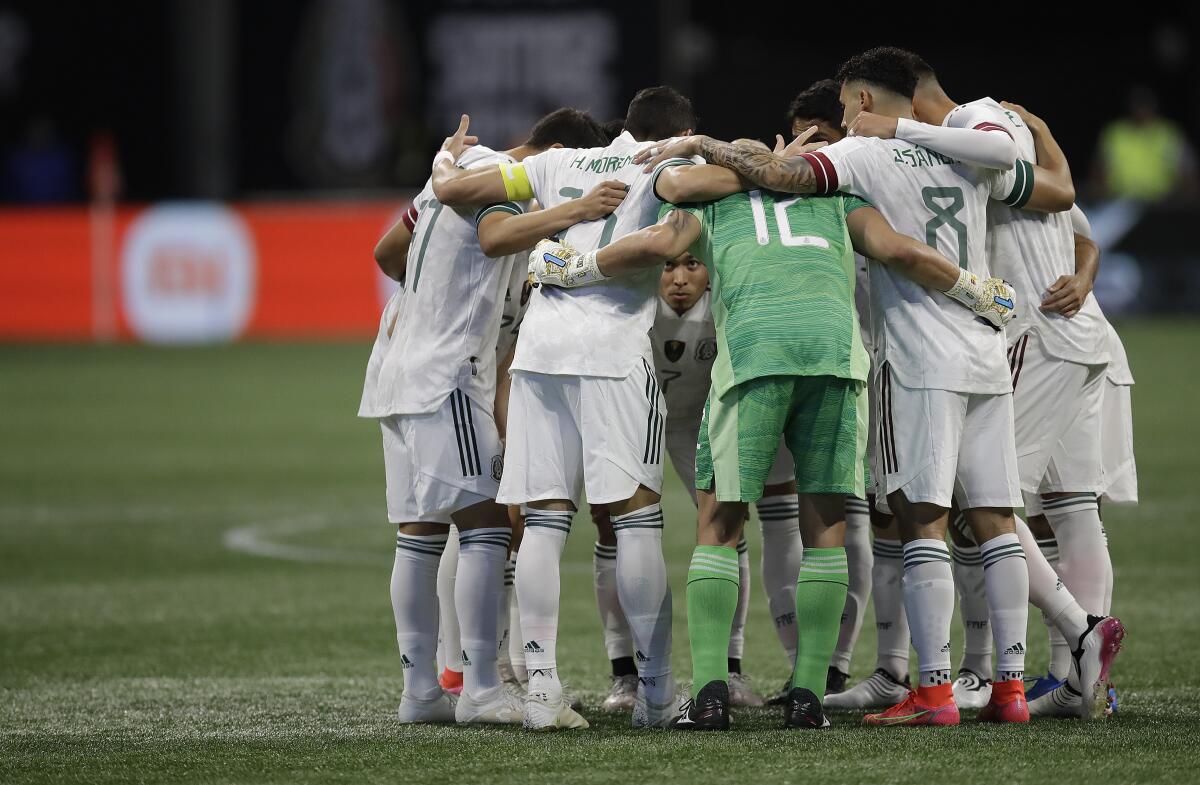
- Share via
Hello and welcome to the L.A. Times soccer newsletter. I’m Kevin Baxter, the Times’ soccer writer, and we begin today with the long-overdue penalties handed down to the Mexican soccer federation last week over the repeated use of an anti-gay slur by fans of the national team.
FIFA, the world governing body for soccer, ruled Mexico’s national team must play its first two home World Cup qualifiers — Sept. 2 vs. Jamaica Oct. 7 vs. Canada — in an empty stadium. The federation also was fined approximately $73,000.
And more penalties may be coming.
The order to play behind closed doors was levied against Mexico after an investigation into fan behavior at the pre-Olympic tournament in Guadalajara last March, an event run by CONCACAF but hosted by Mexico. Fans repeatedly used the offensive chant, which is banned by FIFA’s anti-discrimination policy, in Mexico’s group-play wins over the U.S. and Dominican Republic.
Mexico will play as many as eight games between now and the start of World Cup qualifying, but those will be played in the U.S. And because enforcing any penalties at friendlies or Gold Cup games in the U.S. would have little or no effect on the fans in Mexico who were responsible for the offensive actions in Guadalajara, FIFA delayed that until September.
But FIFA’s investigation is not complete. It reportedly is looking into Mexico’s first three games in the U.S. this year, all of which were halted by officials over fans’ use of the chant. The first, a friendly with Iceland in Arlington, Texas last month, was paused for five minutes over use of the chant and the crowd was even more unruly during the Nations League final in Denver earlier this month, not only using the chant but throwing debris on the field and injuring U.S. player Gio Reyna.
Penalizing Mexico and its fans in the U.S. would be a dramatic escalation by FIFA but perhaps an appropriate one, given that the national team plays the majority of its North American games in this country.
“What for some seemed to be fun, I have news for you. It isn’t,” Yon de Luisa, the president of the Mexican federation, said when the first round of penalties were announced last week. “Because of it we’re kept out of the stadium and kept away from our national team.
“Please stop. Stop now.”
Until recently, the Mexican federation made only half-hearted calls for their fans not to use it. In the last World Cup qualifying cycle, Mexico was fined nine times over use of the chant — and the federation challenged many of those fines.
FIFA finally got serious when the chant was used during Mexico’s opening game at the 2018 World Cup by announcing Mexican fans would be banned from further games in Russia if the chant persisted.
It did not.

Members of Pasión 1927, a Los Angeles-based fan group of the Mexican national soccer team, share their thoughts on a popular chant that is widely considered homophobic.
De Luisa, who was appointed federation president after that World Cup, has taken a more aggressive opposition to the chant by working with Soccer United Marketing (SUM), organizer of Mexico’s U.S. tours, on a series of public service announcements warning fans against use of offensive language. He also has been personally outspoken while doing several media interviews on the subject.
Most helpful perhaps has been De Luisa’s decision to abandon a long-held position that the offensive word has many meanings in Spanish and may not always been derogatory.
“For many years, that was the debate for us at the Mexican federation,” he said. “That is no longer a debate. If it is discriminatory, we should avoid it.
“It’s not the intention with which you shout or with which you chant,” he added. “It’s how the other [people] receive it. If anybody feels it’s a discriminatory act, then it is not something that we should include in a conversation. That is no longer a debate.
“If it is discriminatory, we should avoid it.”
FIFA, which in 2019 approved a three-step process to deal with discriminatory behavior by fans, apparently has determined banning fans from games will be a more successful approach then simply fining a federation that has more money than God anyway.
So now the question is will FIFA’s ongoing investigation end with sanctions against U.S. fans of the Mexican national team? Given the difference between the fans’ behavior in Guadalajara and Arlington/Denver, the answer is obvious.
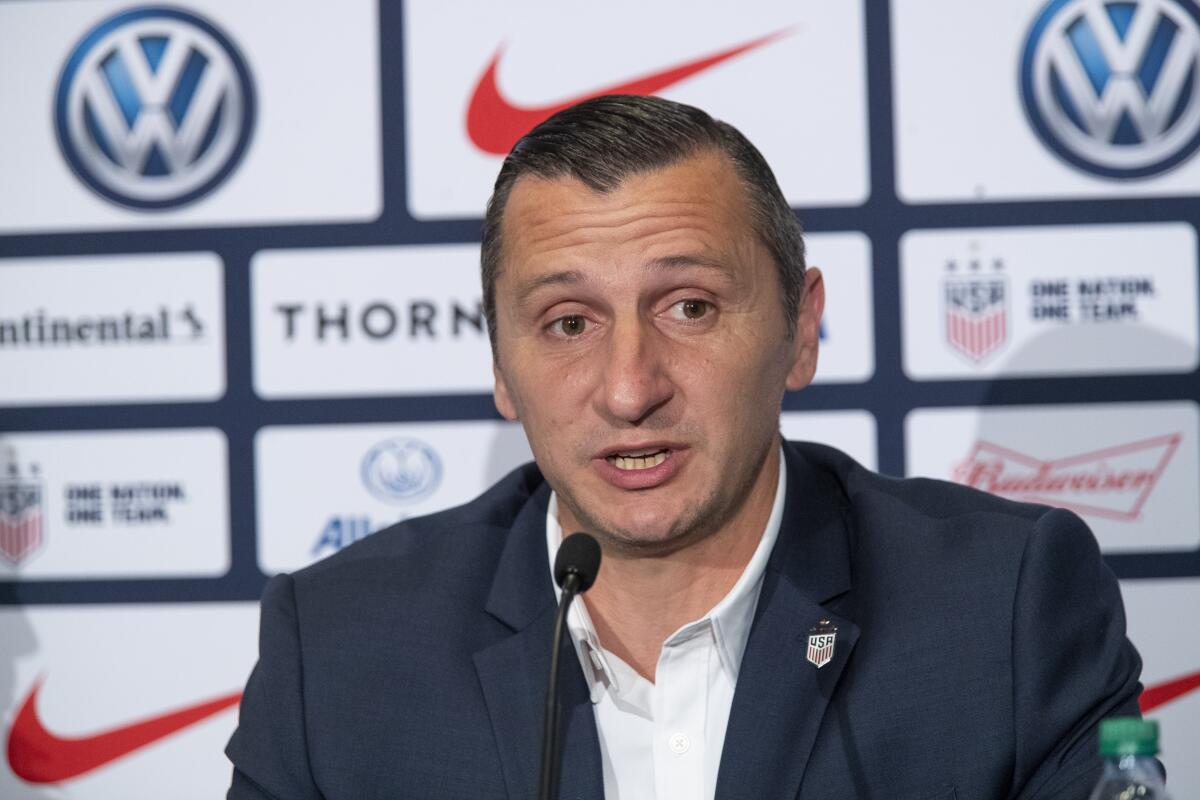
Olympic roster taking shape for USWNT
Vlatko Andonovski, coach of the women’s national team, is facing some difficult choices as he tries to pare his roster down to the 18-player limit for next month’s Olympic Games in Tokyo.
“There are nerves. People will be getting phone calls,” defender Becky Sauerbrunn said in reference to the calls from Andonovski she and her teammates are expecting. “Some of them will be good and some of them will be tough. But that is the way of this program and this team and this Olympic selection.”
Andonovski probably will make the cuts this week, ahead of two send-off games with Mexico in early July. Here are the players he is sure to take:
Goalkeeper: Alyssa Naeher
Defenders: Kelley O’Hara, Sauerbrunn, Abby Dahlkemper, Crystal Dunn
Midfielders: Lindsey Horan, Sam Mewis
Forwards: Megan Rapinoe, Alex Morgan, Carli Lloyd, Christen Press.
That leaves seven spots open with the greatest needs in the midfield and depth on the back line.
Injuries will impact some of those decisions. If Rose Lavelle, who rolled her ankle and missed the team’s last game with Nigeria, is fit she goes. Ditto forward Tobin Heath, who was in training camp this month but hasn’t played for the national team in 2021 after injuring her ankle, then a knee, last winter with Manchester United.
Defensive midfielder Julie Ertz, arguably the most indispensable player on the team, is a bit farther away in her recovery from a sprained anterior cruciate ligament in her right knee. Andonovski appears confident all three players will be ready for the Olympics. If he’s right, that leaves just four more seats to fill on the plane.
He’ll need a back-up keeper, a spot that figures to go to veteran Adrianna Franch, who is back from the right knee injury that kept her out most of last season. Jane Campbell would go if Franch doesn’t.
For the other picks, versatility will count heavily since the U.S. will have to play six times in 17 days to reach the final. That gives an edge to Tierna Davidson, the primary back-up at center back, and Emily Sonnett, who played at both outside back positions and as a holding midfielder in the last two games.
Kristie Mewis also will be part of the conversation in midfield, and if Andonovski takes two of those three it will leave a half-dozen women to fight over the last spot. Expect it to go to forward Lynn Williams over Catarina Macario. Both attackers have game-changing abilities but Williams, 28, has a big edge in experience over the 21-year-old Macario.
“In terms of making the final decisions, I feel pretty good. We have very good knowledge of the players,” Andonovski said. “So when the decision time comes, I believe that we are going to make the right decision.”
The U.S. is 20-0-1 in 21 games under Andonovski and unbeaten in its last 42 games (38-0-4) overall, which includes a perfect run through the 2019 Women’s World Cup under Jill Ellis. Given the level of talent at his disposal, there really are no bad roster choices, only less good ones. The players he is likely to leave behind — Campbell, Macario, Midge Purce, Sophia Smith, Alana Cook and Andi Sullivan – could form the foundation for a “B” team that probably would make the Olympic semifinals.
Tokyo, however, will mark Andonovski’s first major international tournament as a player or coach. It’s one thing playing Jamaica or Nigeria in a friendly, as the U.S. did last week. It’s quite another to face fifth-ranked Sweden and No. 9 Australia six days apart in the group stage of the Olympic tournament.
Press said the coach will have a lot of experience on his roster to help him through that.
“Our system is a well-oiled machine. And there’s a culture of winning,” she said. “Because we have that history and culture, we have such experienced players. And we also have the past to look at, and to study and Vlatko’s definitely a student and a learner.
“That’s what continues to give us the edge.”
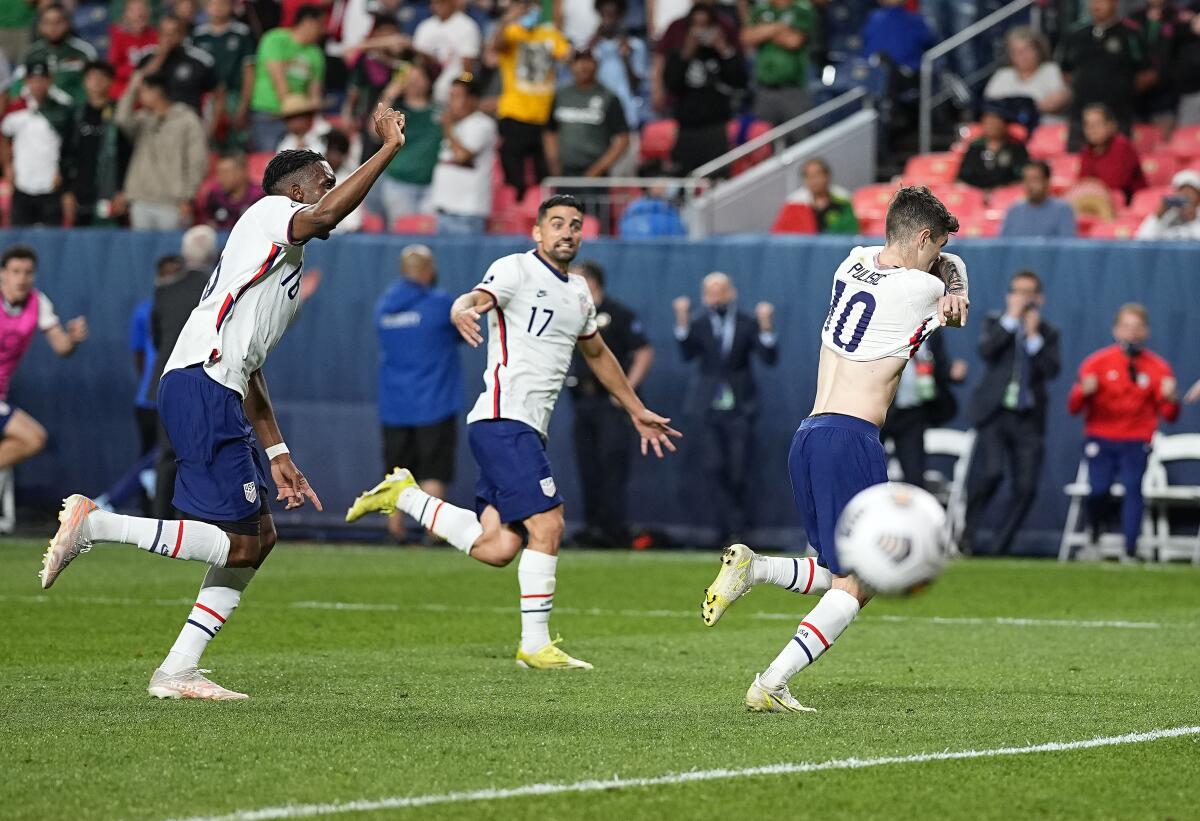
Rough road ahead for World Cup qualifying
Are you ready to enter the octagon?
With El Salvador, Canada and Panama all winning two-leg playoffs last week, the field is set for the eight-team, 56-game CONCACAF qualifying tournament for the 2022 World Cup. The other five countries — the U.S., Mexico, Honduras, Jamaica and Costa Rica — received byes into the final round based on their FIFA world rankings.
It will be the longest final round of regional qualifying in 58 years, and there are a number of dangers for a U.S. team which didn’t reach the last World Cup.
This being CONCACAF, form means little. Results are just as likely to be decided by poor fields, oppressive heat and humidity and hostile crowds. To that you can add a compacted schedule – this time there are 14 games instead of 10 – that will force teams to play their first eight qualifiers in 75 days.
The top three teams will advance to the first winter World Cup, which will kick off in November, 2022 in Qatar. The fourth-place finisher will advance to an intercontinental playoff where another World Cup berth will be at stake.
Venues for some of the seven qualifiers the U.S. will play at home will be announced by mid-to-late July, although the schedule will influence some of those choices.
The U.S. will open in San Salvador, where September temperatures average in the mid 80s but humidity is off the charts. With the U.S. facing Honduras in even worse conditions in San Pedro Sula six days later, expect the Americans to play their middle match with Canada in South Florida, a nod to both the ease of travel and weather.
The U.S. will play Jamaica and Costa Rica at home in October, sandwiched around a trip to Panama, while in November it plays host to Mexico and then travels to Kingston to play Jamaica. Steve Goff of the Washington Post said Columbus, Ohio, which has a new 20,000-seat downtown stadium scheduled to open next month, is among the cities in the running for the Mexico match.
The last five final-round qualifiers with Mexico in the U.S. have been played in Columbus, with the U.S. winning four of those.
After a 10-week winter break, qualifying resumes in January with the U.S. playing at home to El Salvador and Honduras around a road game in Canada. Because of COVID restrictions, Canada hasn’t played a home game since October 2019, when it beat the U.S. in Toronto. If January’s rematch is played there as well, the U.S. may look at nearby MLS stadiums in Philadelphia, New Jersey, Washington D.C. and Cincinnati for its home matches.
Of more immediate concern for Canada, however, is the restrictions on cross-border travel, which remain in effect through at least late July. If they aren’t lifted by September, Canada could be forced to play some of its “home” games in a neutral country, severely hampering its first appearance in the final round of qualifying since 1998.
The U.S. will close out the qualifying tournament in March with two of its toughest games: road matches in Mexico City, where it has won once in 23 tries, and Costa Rica, where it’s never won.
The match with Panama to be played in between could go to Austin or Banc of California Stadium in Los Angeles. In any case expect the U.S. Soccer Federation to wrestle with its decisions over where to play home games. Four years ago, the U.S. played Costa Rica in front of a hostile crowd at Red Bull Stadium in New Jersey, which is home to a sizable Costa Rican community. That loss cost the Americans an eighth consecutive World Cup appearance.
The schedule:
September: 2 at El Salvador; 5 vs. Canada; 8 at Honduras
October: 7 vs. Jamaica; 10 at Panama; 13 vs. Costa Rica
November: 12 vs. Mexico; 16 at Jamaica
January: 27 vs. El Salvador; 30 at Canada
February: 2 vs. Honduras
March: 24 at Mexico; 27 vs. Panama; 30 at Costa Rica
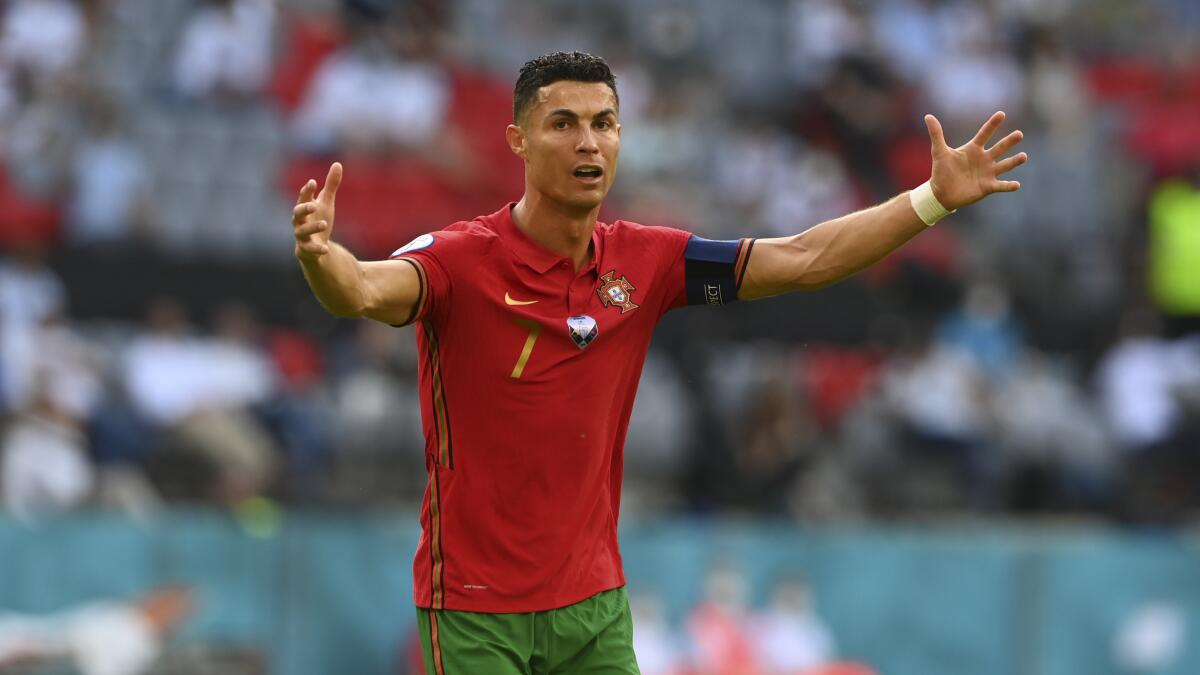
Euros going largely to form
Group play in the European Championships conclude Wednesday with defending champion Portugal and Spain, which won the two previous Euros, in danger of elimination.
Both teams head into the final day of the first round third in their groups, with Portugal trailing France and Germany, the last two World Cup winners, and Spain behind Sweden and Slovakia.
Both would advance with wins — Portugal over unbeaten France and Spain over Slovakia. They could also move on as third-place teams with a draw. Germany, playing its final tournament under World Cup-winning coach Joachim Loew, needs at least a draw in its final match with winless Hungary to improve its chances of staying alive.
Also in danger of an early exit is Croatia, the World Cup runner-up in 2018, which entered the final day of play in Group D in third place. It needs a win over Scotland on Tuesday to have any chance of making the knockout rounds.
Aside from that, the tournament — delayed a year by COVID-19 — largely has gone to form. Italy, top-ranked Belgium and the Netherlands, in addition to France, are unbeaten and on to the knockout rounds.
Also on to the second round is Denmark, which became the tournament’s sentimental favorite after star player Christian Eriksen collapsed after a cardiac arrest in the first half of its opening game. Eriksen subsequently recovered.
Portugal’s Cristiano Ronaldo, with three goals after two games, is tied for the scoring lead with three others, among them Belgium’s Romelu Lukaku. For Ronaldo, the three scores upped his Euro record to 12 goals while Lukaku dedicated his first score to Eriksen, his club teammate at Inter Milan.
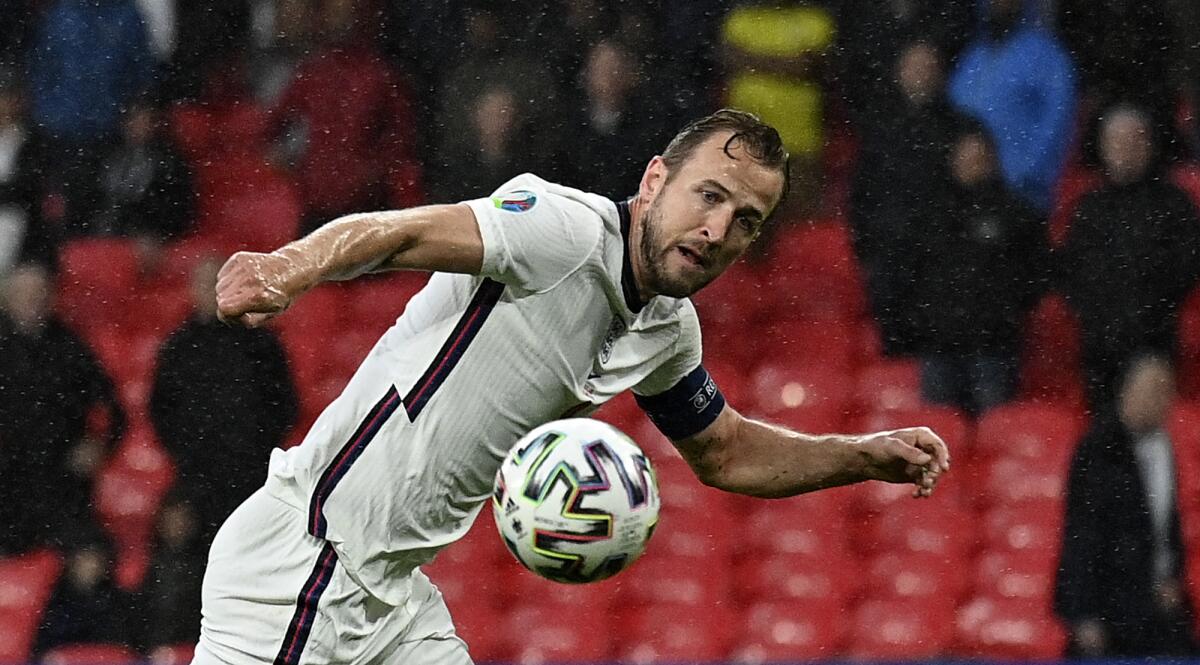
And finally there’s this …
Manchester City reportedly have made a record $138 million offer for Harry Kane, an offer Sky Sports said Tottenham will turn down. Kane, 27, the captain of the English national team, is the reigning Premier League scoring champion, having netted 23 goals for Tottenham last season … Olivia Moultrie, the 15-year-old Canyon Country girl who sued the NWSL over its age rule, last week won another battle in U.S. District Court in Portland, Ore., when the court granted her request for a preliminary injunction. The ruling stops the league from enforcing its policy of not allowing players younger than 18 to sign pro contracts. Moultrie moved to Portland two years ago to train with the Thorns. Last week’s ruling makes it likely Moultrie will get a chance to play in the NWSL this summer since several Thorns players will be away at the Tokyo Olympics … The 11 teams playing in their home MLS stadiums last weekend drew their largest crowds of the season as COVID-19 restrictions continue to ease across the country. Seven of the announced crowds topped 20,000, with the Galaxy getting 23,165 for its loss to Seattle at Dignity Health Sports Park and LAFC announcing an attendance of 22,043 for its draw with Houston at Banc of California Stadium.
Podcast
Don’t miss my weekly podcast on the Corner of the Galaxy site as co-host Josh Guesman and I discuss the Galaxy each Monday. You can listen to the most recent podcast here.
Quotebook
“It was emotional because the last time we saw him he was lying there on the field being saved. We knew that Christian was OK, but it’s completely different to see him in real life.”
Danish defender Joakim Maehle on teammate Christian Eriksen’s surprise visit to training camp last week, his first since suffering cardiac arrest during the team’s opening game of the European Championships
Until next time...
Stay tuned for future newsletters. Subscribe here, and I’ll come right to your inbox. Something else you’d like to see? Email me. Or follow me on Twitter: @kbaxter11.
Go beyond the scoreboard
Get the latest on L.A.'s teams in the daily Sports Report newsletter.
You may occasionally receive promotional content from the Los Angeles Times.





